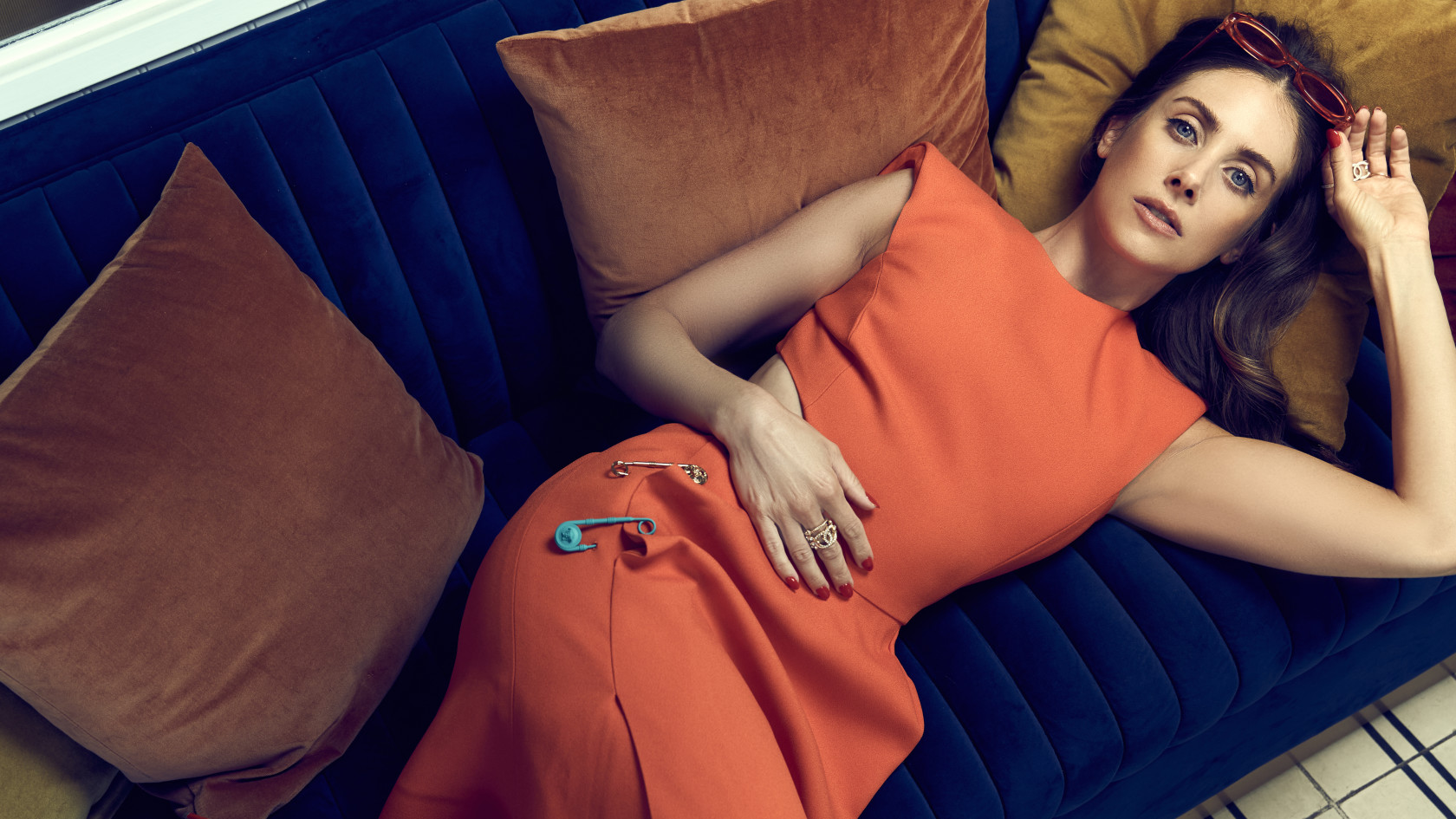
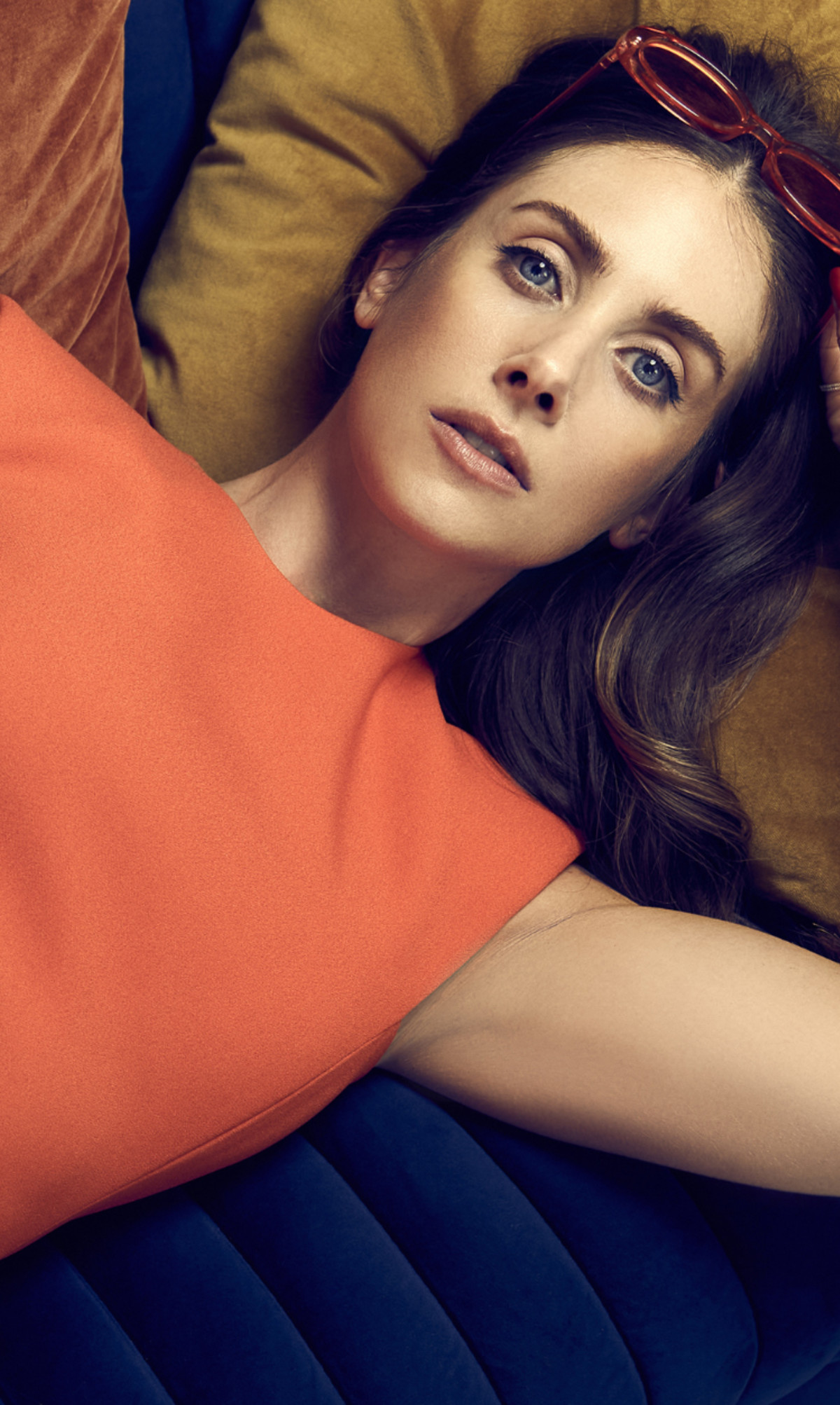
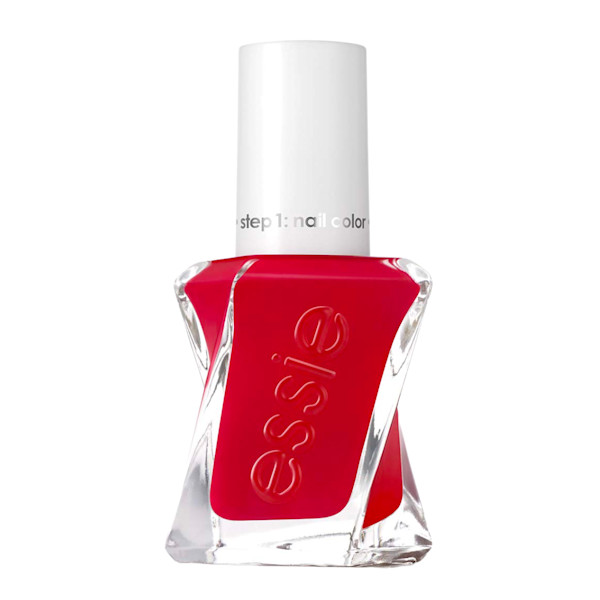



ALISON BRIE
The Glow Up
Equal Parts Fan Favorite And Actor's-Actor, Alison Brie Is Primed To Plant Roots As Producer And Writer, Cultivating Captivating Content And A Corner Of Her Very Own In Hollywood
PHOTOS BY RANDALL SLAVIN
WORDS BY TAMARA RAPPA
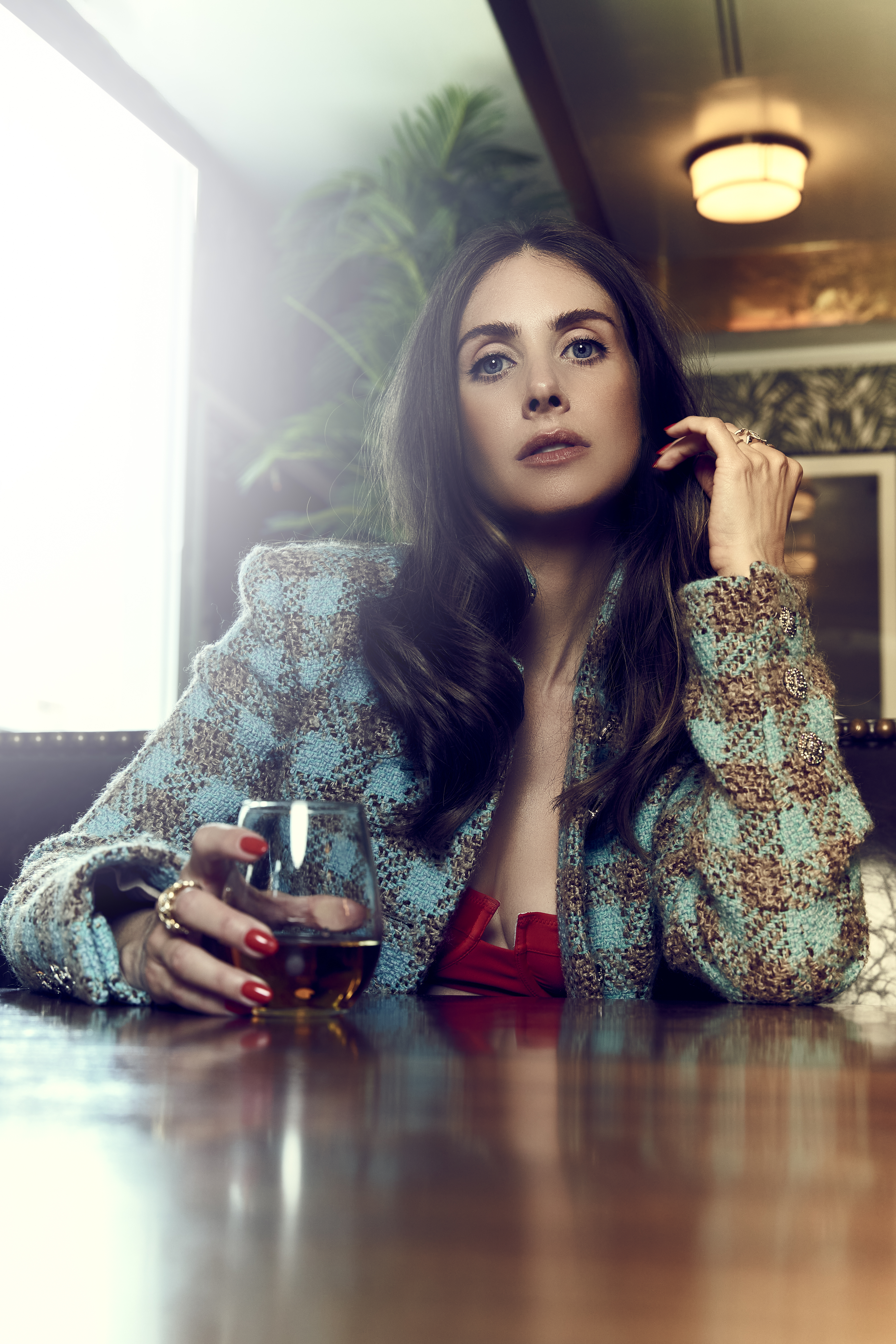
ABOVE PHOTO: Versace Dress; Le Specs Sunglasses; Chanel Rings; David Yurman Rings. THIS PHOTO: Chanel Jacket and Rings; Solid + Striped Bra; David Yurman Rings.
Listen to the extended interview on episode 115 of the Story + Rain Talks podcast on Apple Podcasts, Spotify, or wherever you listen releasing on 8.23.22.
Tamara Rappa: How do you choose the material you want to work on? Your distinct and interesting body of work begs that question.
Alison Brie: Thank you. It's a different process, when I'm looking at film versus TV work, because obviously the time commitment is very different when you're signing away years of your life to work on a show. I've had the amazing luxury of working on what I think are three really incredible TV shows. It's an embarrassment of riches! Some people get one great show in their lifetime, and I feel like I've been really lucky to have some great opportunities in TV, and to make shows that are so different, tonally, stories that find a passionate audience, that are really high quality. That sets the bar really high. So after finishing Mad Men and Community and before working on GLOW, there was a full year, if not a little longer, when I was really picky, and part of that comes from fear. Everything I was reading, I would think, I'm not getting the 'feeling'. In choosing any type of work...there's a gut feeling. Am I turned on? Am I excited? Does this rev me up? When I read the pilot for GLOW, it was tunnel vision. This is the job! We gotta go after this job! I auditioned four times for that role. They were like, 'We want you to come in again'. I was like, 'I'll do it. Where do I need to go?!' I wanted them to know that I wanted the job. No shame. Ready to do anything. Right now, I think I'm in that same position, now that GLOW has ended. I got so much out of Mad Men and Community, but both of them happened really early on in my career, so GLOW felt more intentional. Mad Men and Community were sort of dumb luck, because, at the time, I would have worked on anything. It really wasn't up to me, in that respect, but I was still very excited.
"I feel like I've been really lucky to have some great opportunities in TV, and to make shows that are so different, tonally, stories that find a passionate audience, that are really high quality."
TR: And you were doing the job beautifully...
AB: Thank you. I certainly recognized that the material was so good, when I was going into my audition for Mad Men but I was like, great, add it to the list of the five pilots I'm auditioning for next week. My Mad Men audition wasn't for the pilot. I came in on the fourth episode of the first season. It was a very mysterious job, because it was the very first original programming on AMC ...and that also makes me feel like a relic.
TR: Everything has changed so much, since.
AB: ...AMC, the channel that shows old movies, is going to make this show about the '60s? Then I read it and thought: wow, this is really good. I remember getting a bootleg copy of the pilot before it came out from my friend's friend, who was an agent's assistant. I had already shot an episode or two, then I watched the pilot for Mad Men, and I remember thinking, this show is so good, but it's never gonna make it. It doesn't look like anything else on TV, it's very slow. My heart sank a little, thinking, It's too good, it's not going to last. So that was interesting and unique. By the time I'd finished those two shows the bar was already set high, and I had the power to wait to find the right thing. Post-GLOW, as I'm reading a lot of television and also developing some projects for television, it's been that same moment. What's revving me up? What's exciting to me now? To me, TV is just a bigger part of my life and of who I am, I think. My film jobs are like fun treats that I get to go and do, and when I think of my work in television, there's more. You work on shows for years. I can track my life through the shows that I've worked on, here's where I was at this point in my life; I was 24 years old when I started working on Mad Men; I was 26 when I started working on Community; GLOW was the show in that next stage of life, in my 30s, when I felt differently as a woman; empowered by that storyline. Then, I'd wanted to show a different side of myself physically, and in a lot of other ways. I matured while doing GLOW. What I gained from that job and that experience, from directing an episode to being number one on the call sheet; to the physicality of everything that we were doing; to shooting my first nude scenes---there were just so many firsts, a lot of milestones. Now, I find myself turning 40 in December and wanting to take stock of where I am in my life. How do I feel as a person, and as a woman? In terms of the next character I play, how am I going to connect with her in a different way than I have, for other characters I've played? Movies? What's a fun thing I could go and do for a couple of months?
"When I read the pilot for GLOW, it was tunnel vision. This is the job!"
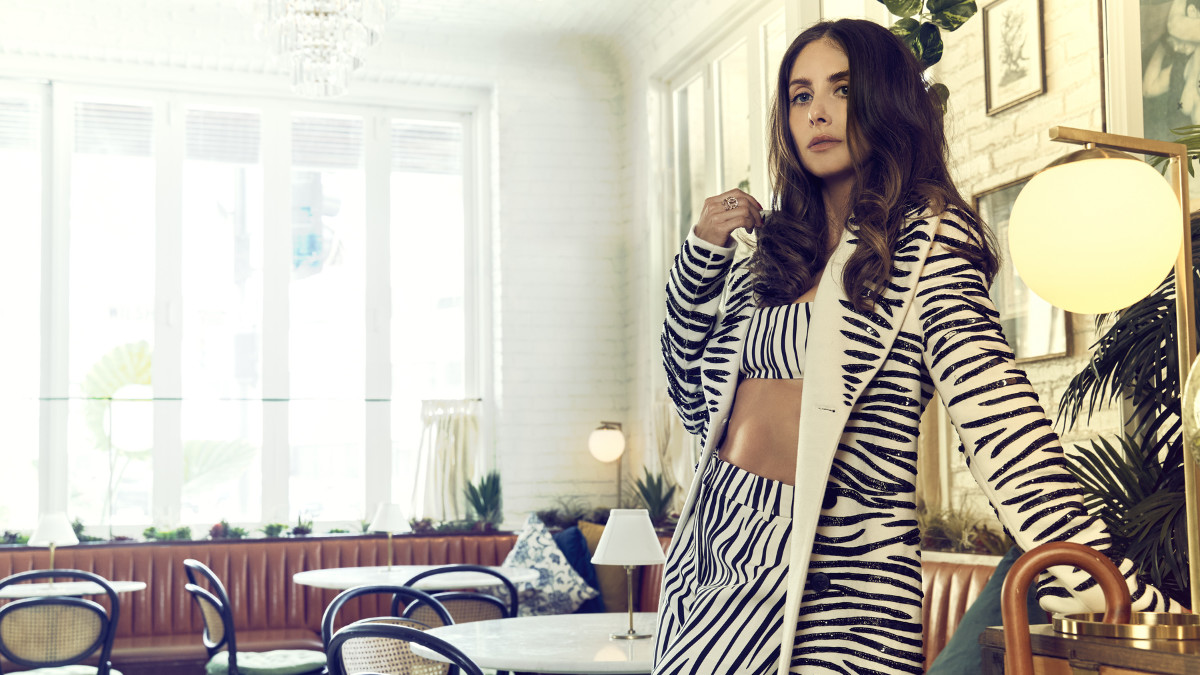
Valentino Top, Jacket, and Pants; Chanel Rings; David Yurman Rings.
TR: You've collaborated closely with various incredibly talented people; how do you know when you're in the presence of talent or greatness, as you, yourself, define it? How do you know when you're in the presence of a fulfilling creative ride?
"I watched the pilot for Mad Men, and I remember thinking, this show is so good, but it's never gonna make it. It doesn't look like anything else on TV."
AB: It's probably a lot like dating. There's a magic to it. There's a clicking that happens. When I was dating, I was kissing a lot of people, and always analyzing sexual attraction and connection. My take on it was, I don't think that there are good kissers and bad kissers; there are compatible kissers. Surely there are probably some people who need a few lessons! But you have to imagine that there's someone for everyone. That's how I think of the creative collaboration process. When it clicks, it clicks. When you're both on the same page it's like magic. You just feel it, and it's exciting.
TR: What needs to be in place for you when it's time to sit down and write? How have you developed your process? You co-wrote Spin Me Round, your latest project, there was your writing for Horse Girl, also by Jeff Baena, and Somebody I Used to Know, up next.
"I'm very nostalgic about GLOW because I know that there will never be another job like that, where I get to do so many things in one role. A big takeaway for me was what a joy it was, and that I looked forward to work."
AB: ...Which I wrote with my husband Dave. I'm still developing my process. I don't know that it's fully honed just yet. Still dipping a toe. It's been really helpful for me to have collaborators, when writing. Acting is so my first passion, my life's passion, since I was a little kid. When I'm working on a role, from an acting perspective, I'm so ready to do research, to do the work. With writing, sometimes it's difficult for me to find the motivation. At first, that was fear-based. The idea for Horse Girl was something I'd been kicking around in my head for years, I didn't really want to tell anyone about it, I never thought I would really write something. I was just kind of scared that I would tell my idea to someone, and they wouldn't like it. There's a tedious nature to writing. By the time actors come into the process of the project, that's the most exciting part, being on set doing the thing. The work of writing is so different. It's been helpful for me, with Jeff, that our collaboration has grown over time, it's been very organic. It's slow-paced and very, 'let's wait for the inspiration to come'. When we wrote Horse Girl, I had an idea, and he had a seed of something. We married those kinds of things together for Spin Me Round. He had the seed of an idea that he brought it to me, and then we fleshed it out together. It started with something specific. Jeff is kind of leisurely, it's a lot of self exploration and a lot of talking and talking about the stuff that we find funny, talking about stories from our lives, what's going on with our friends, and then some of that stuff finds its way in. There's a through line too, in terms of the way that I wrote Somebody I Used to Know with Dave. But then, also, Dave and I wrote together during quarantine...
"I don't think that there are good kissers and bad kissers; there are compatible kissers. Surely there are probably some people who need a few lessons! But you have to imagine that there's someone for everyone. That's how I think of the creative collaboration process. When it clicks, it clicks."
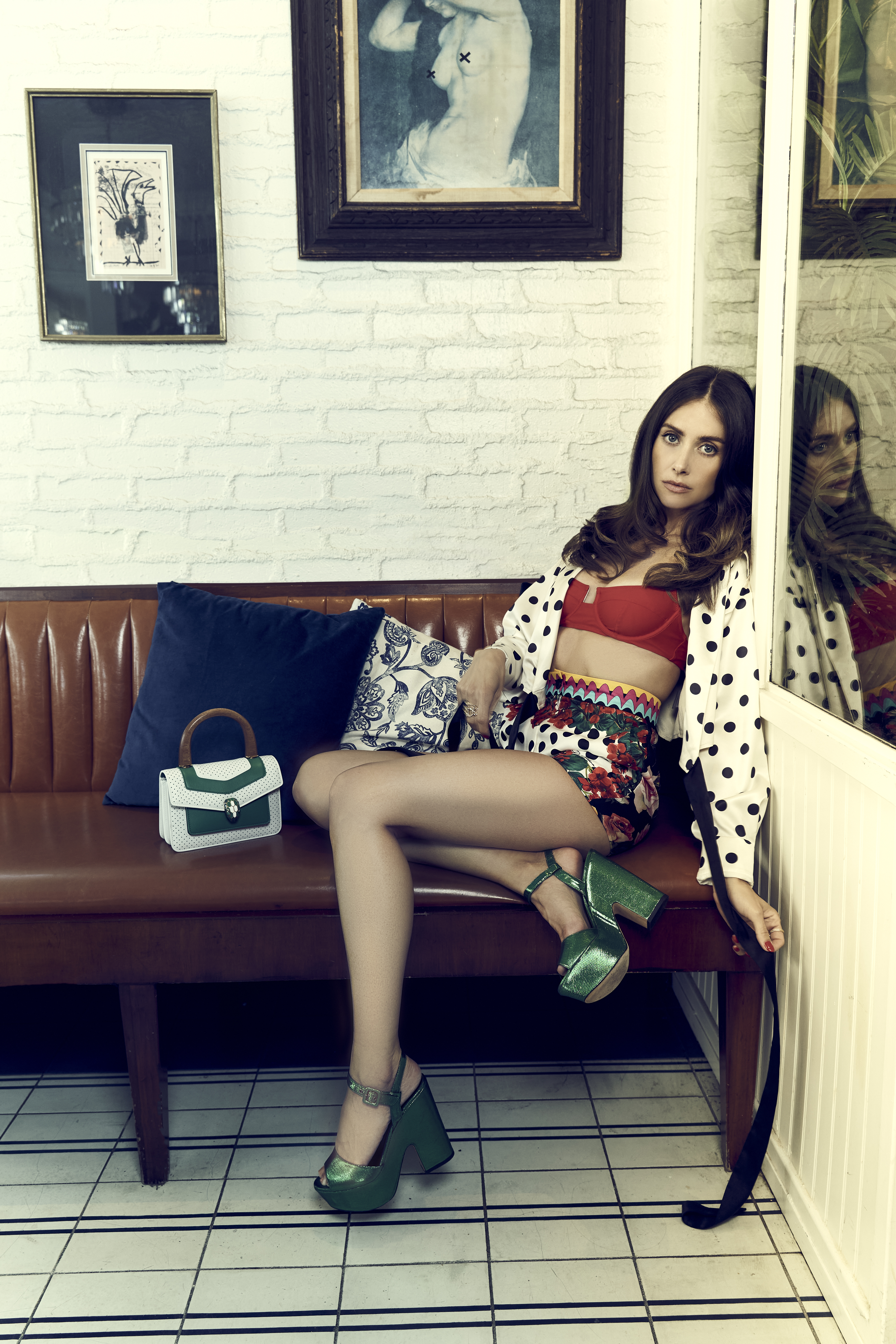
Hansen + Gretel Top; Solid + Striped Bra; Dolce + Gabbana Shorts; Le Silla Shoes; David Yurman Rings; Chanel Rings; Bvlgari Bag.
TR: What was that like?
AB: In a way it was kind of like a writer's retreat, a writer's intensive. We thought, let's write something together. We came up with the idea together. We were at home in Dave's hometown of Palo Alto around Christmas, we were on a long walk together, and we started to talk about different ideas. Then, we started to write down notes about those ideas. Then, we both got excited about a part of the idea. There was a lot going on. I was going into shooting season four of GLOW, and I was promoting Horse Girl. It seemed like there would be no window. Then, of course, everything stopped, the world stopped, we were all in lock down. Dave would be quite the task master. Monday through Friday, we had set hours. It was really helpful for us to keep a routine during quarantine, so we weren't losing our minds.
"It's been helpful for me, with Jeff [Baena], that our collaboration has grown over time, it's been very organic. It's slow-paced and very 'let's wait for the inspiration to come'."
TR: How many hours were you writing a day in quarantine?
AB: I don't know, it was so many! As actors, we were already used to creating routine in our lives, because we always have breaks when we're not working. If you don't create your own structure, you can go a little loopy. I don't think we planned to do eight hours a day, but it probably did end up being that. I also found it really important during quarantine, to set an alarm. During the week, we can't just sleep until whenever! To create some consistency, we would set an alarm and have routines. Wake up, workout, take a shower, meet in the living room, or maybe convene outside on the deck, then write for four or five hours. Then I would be like, 'That's enough writing for today', and go into the kitchen to start making dinner. Then Dave would come sit in the kitchen and get me to keep writing!
"I find myself turning 40 in December and wanting to take stock of where I am in my life. How do I feel as a person, and as a woman?"
AB: But I do feel like Dave and I found a groove that was helpful. He likes to sit and be at the computer, and I have to move around. Because we're both actors, it was really fun. The sweet spot for us was work-shopping dialogue. We would act out the scenes together. Sometimes, he would kinda trick me into it. I'd be cooking dinner, my mind on other things, and he's sitting there saying, 'I'm going back to this one scene when they're having this discussion. Is this really the way you would say this, what do you think?'...while I would be cutting carrots. I think that's when we found some of our best stuff; when I was working on something else, using another part of my brain and sort of not overthinking it. There was a distraction going on. Dave's flying my creative side that thinks it's on a break.
"I always like to bring a lot of personal experience to my writing, sometimes on a micro level, and sometimes, verbatim."
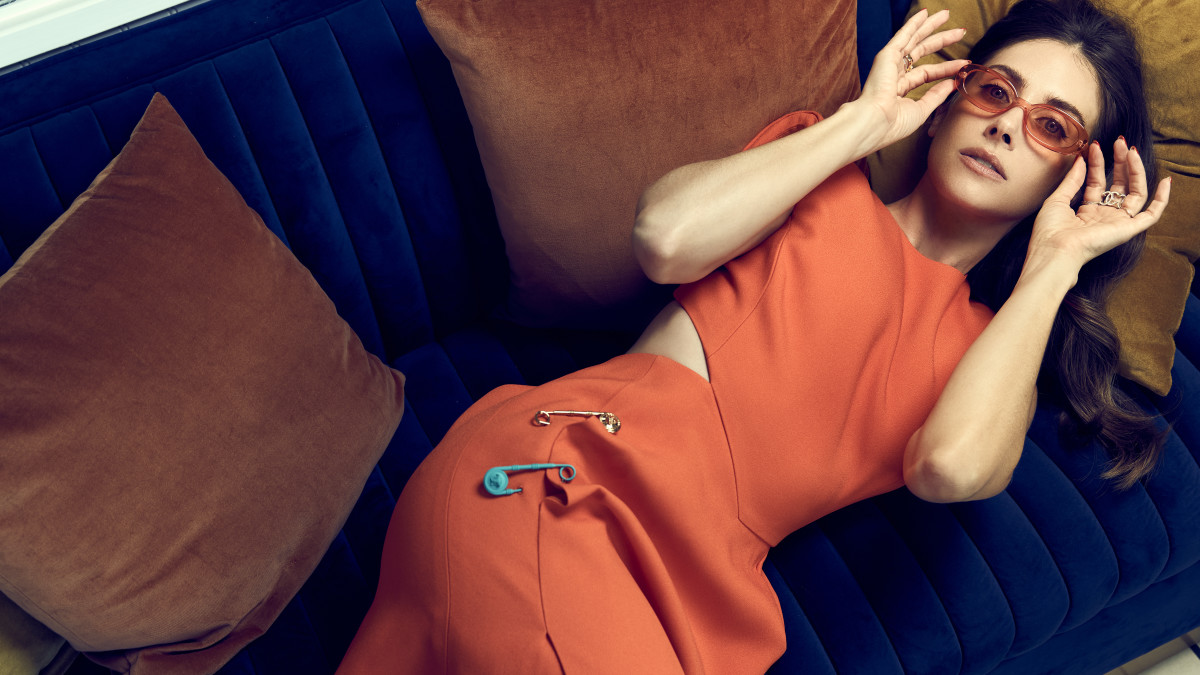
Versace Dress; Le Specs Sunglasses; Chanel Rings; David Yurman Rings.
TR: When you think of someone who has made a huge impact on you, in terms of their own creative process or work ethic, who comes to mind? Who has blown your mind?
AB: Betty Gilpin, who I acted with on GLOW, blew my mind. Betty blows my mind. I think she is such an incredible actress, very spontaneous. Our histories are so different, because she spent a lot of time working in the theater in New York. Her theatrical background lends itself to such a rawness in the way that she works. It really inspired me while working with her on GLOW. At the same time, it was just so fun. Fireworks, every time we had scenes together. As a person, I love her, she's like my soul mate. Another thing that was a real gift about working on GLOW, was that it lead me to her. Now I get to have her in my life. She's a real touchstone for me when I'm working on other things; I kind of try to think from her perspective.
"Sometimes, he would kinda trick me into it. I'd be cooking dinner, my mind on other things, and he's sitting there saying, 'I'm going back to this one scene when they're having this discussion. Is this really the way you would say this, what do you think?'...while I would be cutting carrots. I think that's when we found some of our best stuff."
TR: What kind of director makes the most positive impact on your work?
AB: Two people come to mind. The first is Steven Spielberg. I got to work with him on The Post. He was so generous with his time. I'm in a handful of scenes in the movie, a supporting player, and probably number twenty on the call sheet. When I was on set in between scenes, I found myself kind of shadowing him, [laughs], asking him about the way he would set up a scene and why. He was so generous with information, and about his process, and he was supportive of me. The first season of GLOW came out while I was shooting The Post, and I'll never forget being on set and shooting a scene where I'm essentially background, I don't have any dialogue, I'm in a big crowd of people. Steven Spielberg comes to work and goes, 'Alison, I watched the first episode of your show, it was so great, I loved it. And I'm sorry, I couldn't get to the second episode, because I'm editing Ready Player One after we finish shooting this, so I only had time to watch one episode.'. That was so kind, especially for someone so prolific. Even though he works in so many different genres, you know when you're watching a Spielberg film. But it's interesting to me, when I watched him work, I saw that he could be very spontaneous. He would watch Meryl Streep and I rehearse a scene, and interrupt us and say, 'Stop, this changes everything. The way that I saw Meryl do that move...I'm going change the first shot'...even though an hour had just been spent setting up that shot prior to rehearsal. I admire his spontaneity. He was so open to that magic in the moment, which is part of why he is who he is. The other person I think of, is my husband, Dave. I don't think it hurts that I'm in love with this person! We shot The Rental together, in which I just acted, and he co-wrote with Joe Swanberg, and also directed it. We had acted together prior to shooting the movie, but that was our first time in this new dynamic of director and actor. It was so wonderful. It's hard to explain. While a lot of people geared us up to brace ourselves for possible disaster, it was really extraordinary to watch the person that I love excel at this new thing, so wholly, so completely. Dave is such a kind person, such a good person, so collaborative with the crew, with everybody involved, he works so tirelessly to put together a crew of people that are super invested and very excited about the material; good, enthusiastic people. Then, he gives those people the space to be creative and to shine. It was amazing to watch him work, and to get to witness it for the first time, to see him shine in another way. And I just feel so comfortable around him, I feel he knows me better than anyone in the world. I think that elevated my acting, because I know I can't bullshit this guy, you know? I'm not going to get away with any old tricks. It made me feel very vulnerable within the scenes, and I was not afraid of that vulnerability, because I trust him so inherently. It was the same, if not more, shooting Somebody I Used To Know, because we had written it together. We were mind-melding even more, almost communicating telepathically about the scenes, and it felt like a true partnership.
"Fireworks, every time we had scenes together. As a person, I love [Betty Gilpin], she's like my soul mate."
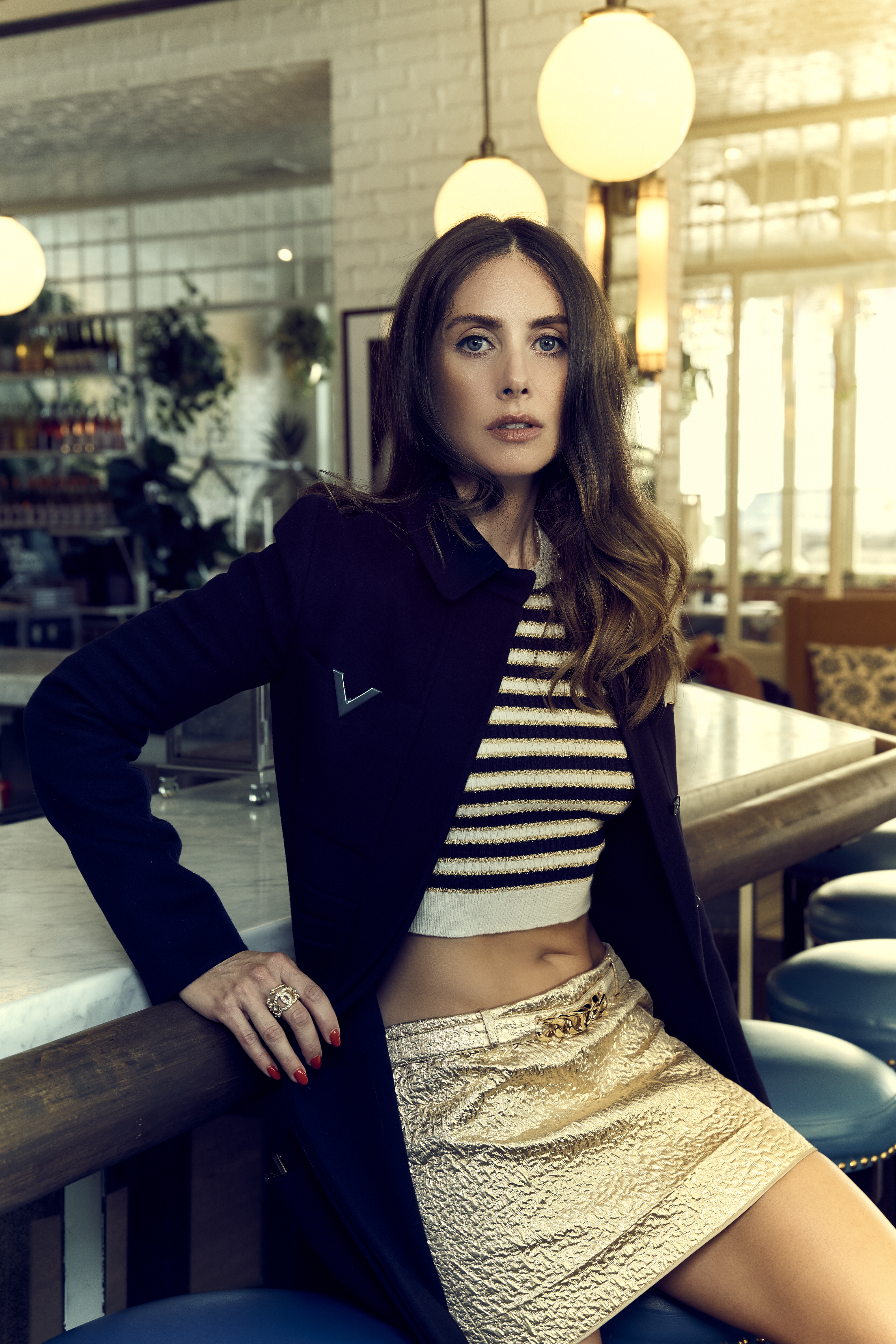
Valentino Jacket, Top, and Skirt; Chanel Ring; David Yurman Ring.
TR: You've been widely and publicly recognized for your work. You're a two-time Golden Globe and a five-time SAG award nominee, with a SAG award win during your time on Mad Men. Does that boost confidence, and in turn, boost performance? Does it serve to make you a better actor in any way, or do you and will you forever view your craft as a work-in-progress, so things like awards don't make that kind of an impact?
"l'll never forget, being on set and shooting a scene where I'm essentially background, I don't have any dialogue, I'm in a big crowd of people. Steven Spielberg comes to work and goes, 'Alison, I watched the first episode of your show, it was so great, I loved it. And I'm sorry, I couldn't get to the second episode, because I'm editing Ready Player One after we finish shooting this'."
AB: If anything, I think it's a hindrance to one's confidence and the creative process. My experience with all of that stuff has been surreal. Dave and I have talked about this quite a bit actually. I's such a strange thing, to make anything in a creative capacity, is so difficult, there are so many hurdles. Then you make the thing, and hopefully, in a best case scenario, there's a real magic to the thing you're making, you feel good. Then you see it, and you're so excited. It feels great for other people to like it, but most importantly, you want to like it and feel proud of the thing you made. Then, when there are nominations, it sort of spikes everything, right? Now it's on steroids, and people love it. Then, just as quickly, it's followed by this sort of cutting down. The process of awards shows is weird. You go into the evening feeling so good about the thing you made, excited that it's being celebrated. I've won a few of the awards, and most of the time you leave going, 'Well, now I'm just not a winner.' This thing that I was so happy and excited about before...has now been stripped down and put into this competitive context. I always joke with my friends. 'Awards are bullshit, unless I'm nominated, and then it means everything." It's all the machine. Prior to GLOW, because on Mad Men I was just on the periphery of that stuff, I wasn't privy to the whole machine. It's really its own whole thing. There's so much at play that has nothing to do with the creative things; a lot of politics is involved, a lot of different things that I still know very little about. It's hard not to get caught up in it, absolutely, when you're in it, and it's also hard not to lose perspective on some of it and come out on the other side feeling a little chewed up and spit out. At the same time, I'm so grateful that the work that I've done has been recognized; it feels really nice and validating, you can't say that it doesn't. With distance from it, I've gained perspective. It's not everything, just a kind of a fun icing on the cake, maybe. It's fun to put on a beautiful dress, it's fun to get to borrow some amazing jewelry and go out for the night. It's about having a little more fun with it and not make it everything, because prior to cracking into that world, it wasn't anything. The art was just about the art.
TR: You're someone who had been interested in acting at an early age. How have your choices and ideas for what your career would look like, take shape over the years?
"While a lot of people geared us up to brace ourselves for possible disaster, it was really extraordinary to watch the person that I love excel at this new thing, so wholly, so completely."
AB: It's been so different than what I imagined as a kid, and also because of what you said, the landscape has changed so much. There's so much that I couldn't have even imagined. First and foremost, when I was a teenager, and this is crazy to me now, because I watch so much TV and have always watched so much TV, when I was a teenager, I was like, 'I'm going to do theater, and I'm going to do independent films and, yeah, win an Oscar'. You know? I did not think about acting in television, at all. I went to Cal Arts and studied theater. I studied in Glasgow at the Royal Scottish Academy of Music and Drama, did a semester there, and had an amazing time. I loved doing theater, and I really wanted to do films, and I almost kind of looked down at television a little bit. I find it really funny. The day after I graduated from theater school, I would've taken any job. You realize that you just want to make a living doing the thing that you love. The first film job I did was a B horror movie called Born. Don't recommend, don't recommend [laughs]. And I did an episode of Hannah Montana. That was my first job on television. Immediately, what I learned was that I loved acting so much, I would do it anywhere. I did a student film at USC. Just throw me anywhere. People ask me, 'Are you interested in doing another TV show?' Yes. I love working in TV so much. I love getting to tell a story that spans years, and watching a character grow and change across the years of a television show. It's really fun for me, getting to delve in and play characters who really develop a relationship with the audience. That's something that's unique to TV, though there are some film franchises that do the same thing. If somebody is like, 'You're a TV actress', I'm a little bit like, 'I do it all.' But. I am a TV actress.
"The awkwardness of the human experience is a big part of the language and the beat of this movie. We let some scenes really sit. We let the audience really sit in awkwardness between the characters. I think that kind of stuff is funny."
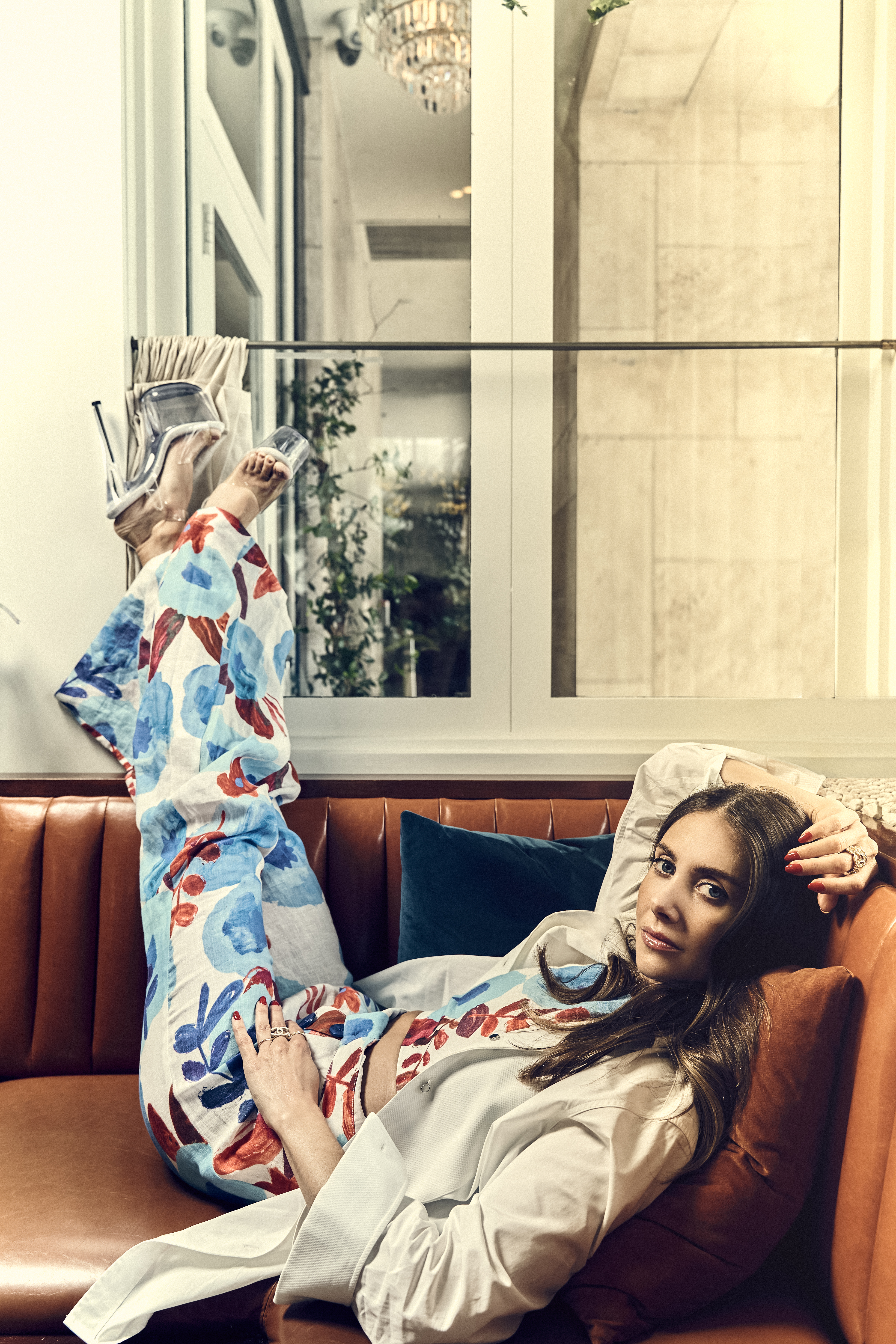
Raisa Vanessa Top and Pants; Dolce + Gabbana Button Up; Pleaser Shoes; Chanel Rings; David Yurman Rings.
TR: Is there a creative point of view that you tend to adhere to or gravitate towards, in your work?
AB: Maybe just, in a really broad sense, an element of surprise, or something that's unique, or at least unique to me. You know, I say that, and then it's different with each project. You really just have to find the one thing that's exciting. I would like to think that it's all character-driven. If the character's great, then I want to do it. But that's not totally true, because I'll read scripts and think the character's great, but I don't like the story; I'm bored. Or maybe I'll read a script and think I've played a character similar to it before, but I think it would be really fun to explore the character in this new context. It's kind of different every time. It's just also about personal taste. These days when I read something, I'm thinking, 'Would I want to watch this?'
"I've won a few of the awards, and most of the time you leave going, 'Well, now I'm just not a winner.' This thing that I was so happy and excited about before...has now been stripped down and put into this competitive context."
TR: What do you do to refuel and recharge the artist in you?
AB: I love watching movies. I love when I see something that I really love, it really does super charge me. I'll dance out of the theater, being like 'Yes!' I also love to just really unplug from everything. And I love to be physical. When I think about Jeff and I in our writing process, sometimes, when we would kind of hit a wall, we would always go for a walk. A lot of our writing process took place while hiking and walking, and Dave and I would do the same. And as I said, when I'm writing with Dave, I like to be up and walking around. Exercise is very meaningful to me. It's a big part of my life, a big part of who I am, and it's helpful for me in terms of mental health and my joy and energy levels in life. I'm always energized by doing something physical, and challenging myself in that space.
TR: How do you and Dave connect creatively? Does it make life easier to share in your creativity? Is it hard sometimes?
AB: It's mostly easy. It's mostly really, really gratifying to be able to share that. Even before we were working together, it felt nice to be in a relationship with someone who does the same job as me, that there is an inherent understanding, because the job we do is weird and it requires us to sometimes be apart for a long time, and sometimes be intimate with other people. There are all these parts of the job that are a little bit strange to someone who may not work in this industry. I've always been grateful that we have a built-in understanding of what we do, and what a priority it is in our lives. Our creative endeavors are not just work, we're very invested in what we do. Luckily, we really have similar taste in everything, so we watch a lot together. And it's nice that we generally have the same reaction to what we watch. Every so often there might be something where he'll go, 'You can watch that show without me'. And I'll go, 'Great', and then watch it all in two days.
TR: Whose work do you appreciate? As an actor, who and what do you look forward to watching, and set the scene for how and when you get to unwind and appreciate TV and film?
"When I was a teenager, I was like, 'I'm going to do theater, and I'm going to do independent films and, yeah, win an Oscar'. You know? I did not think about acting on television, at all."
AB: Over the course of lockdown, and even still, it's fun for us to almost, in film school-style, say, 'Let's watch all the Cronenberg movies'; or watch stuff that we haven't seen. I have a lot of fun memories from high school, of going to the local theater and seeing indie movies on the weekends. Dave is constantly challenging me with independent film, which has always been a love of mine. He'll make me watch things that are very obscure, that sometimes I love, and sometimes I don't. [Laughs] I get inspiration, and sometimes I really hate stuff, and I kind of like that feeling too. Is the biggest sin thinking it was just fine? I admire a big swing. You might watch something and think, I don't know if this was for me, but I like that they've tried something really different.
TR: What kinds of work would you like to take part in making in the future, as a writer, director and producer, and also as an actor? Are you thinking about that kind of thing, or are you going with the flow and not charting the course heavily?
AB: A little bit of both. I'm looking for a TV project and looking to develop some things that I feel excited about as both a producer and actor. On the film side of things, I'm craving something a little bit dangerous, a little bit messy.
TR: What does that mean?
AB: I don't know yet, because I haven't quite found the thing. In Spin Me Round, my character is pretty restrained. I think I'm desiring to play a character who's a little more messy, get my hands a little dirtier, be a little louder, take up more space. I don't know if that also means it's in the thriller genre? Is it a horror-thriller? It's going be a matter of reading something that kind of scares me, and that I do, to shake things up.
"People ask me, 'Are you interested in doing another TV show?' Yes. I love working in TV so much. I love getting to tell a story that spans years, and watching a character grow and change across the years of a television show. It's really fun for me, getting to delve in and play characters who really develop a relationship with the audience."
TR: Your role in Promising Young Woman was a powerful one. It's hard to describe it in any other way. How do you describe it?
AB: I seldom describe it, so I'll do that on the fly now. In the moment, I thought it was important. It was important to show a female character who was at odds with the protagonist of the film, because the driving force of the whole movie is so female-forward. Wen you're telling a story like that, you don't want to make it really gendered. 'This is about women versus men'. 'The women are righteous, and the men are evil'. You know? Here's an example of a woman who is on the other side, at odds with the main idea that we're trying to convey. And at the same time, with every character that I play, I have to find the human parts. I also think that character was representative of a kind of woman who was simply unable to admit certain things and behaviors to herself, because they were so traumatic. She was a person who had also experienced trauma and dealt with it in a really toxic way. My character got to have this arc of having a realization about her toxic behavior, and choosing to possibly change moving forward. That felt really meaningful. I loved being a part of the project, the script was so... talk about a great, unique read. I read it and I just thought, I've never read anything like this. And I really appreciate the fact that every character in the movie has a lot of impact. Every role, every person has one scene, but those scenes carry weight, all of the characters are really multi-dimensional. Emerald [Fennell] did a great job, I had a really fun time shooting. The scene I shot with Carey [Mulligan] in the restaurant was the first day of shooting, so that was kind of interesting. It felt like I got to be there the day that the tone was set for the movie.
TR: What was the process like for working on Cecelia Ahern's Roar for Apple TV+, which released in April, and is currently streaming?
"Exercise is very meaningful to me. It's a big part of my life, a big part of who I am, and it's helpful for me in terms of mental health and my joy and energy levels in life."
AB: The process started with getting a call from Liz Flahive and Carly Mensch, who created GLOW. GLOW had already been cancelled, so I was excited to get a call from them about working with them again. I would put them high on my list of my dream collaborators. I love them so much, I have such respect for them, I think they're brilliant writers, and I really admire their commitment to telling feminist stories that are palatable for everyone. They called me and said, 'We wrote an episode of this anthology series, Nicole Kidman is producing it, it's these feminist fables, and you would play a ghost.' And I was just like, 'Let's do it.' I got to read the script and talk about some ideas that I had for the character, and they were totally receptive to it, open to working them in, which always feels really nice. Shooting it felt like a bit of a GLOW reunion because a lot of our crew from the show worked on it. Betty [Gilpin] was in an episode. Also, Chris Lowell, who was in GLOW, was in my episode with me. It was cool shooting it, because you were just sort of like, 'I'm the star of this show for a week and a half' [laughs]. For two weeks, it was like this great little meal that we each got to have on our own, but we still felt connected to all of these really talented, amazing women. It was a moment that gave me a lot of closure, in terms of the GLOW cancellation, being back on set, and getting to hug our sound guys, Beth Morgan, our costume designer, our hair and make-up gals. It was just fun. When I wrapped my episode, it was like, 'This is the wrap.'
"There are aspects of my reality too, in Amber's relationship with Alessandro Nivola's character, Nick. When I was in my 20s, there were certain experiences I had with men in which I was made to feel uncomfortable, or didn't feel so uncomfortable at first, but then realized certain things later."
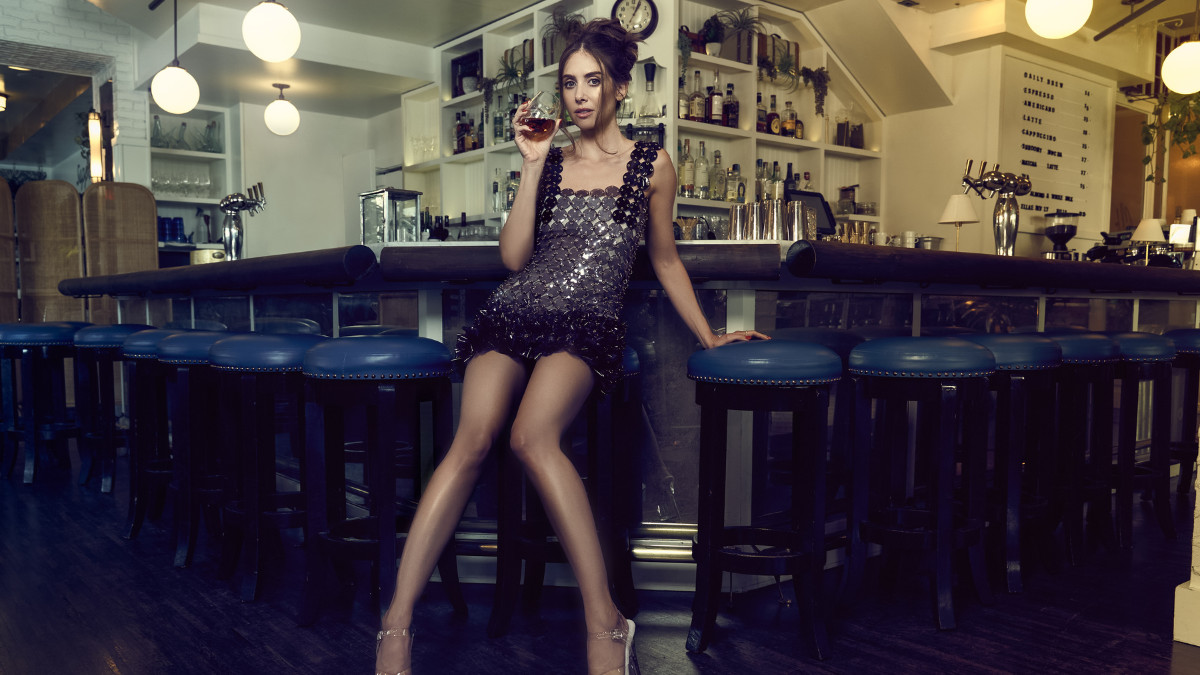
Paco Rabanne Dress; Pleaser Shoes; Chanel Rings; David Yurman Rings.
TR: GLOW ran between 2017 and 2019. Three years later, what do you reflect upon when you think about your role, and that major time for you?
"There are all these parts of the job that are a little bit strange to someone who may not work in this industry. I've always been grateful that we have a built-in understanding of what we do, and what a priority it is in our lives. Our creative endeavors are not just work, we're very invested."
AB: I think about the personal milestones. Getting to direct on that show was really important to me, and the physicality required. I'm very nostalgic about GLOW because I know that there will never be another job like that, where I get to do so many things in one role. The way that we were able to do the broadest comedy, with the wildest hair and make-up, and then also do really nuanced dramatic scenes, and have this superhero style physicality. It was all there. To have romantic scenes, and work with this huge ensemble of women; be surrounded by women, constantly. I think that was a big takeaway for me: what a joy it was, and that I looked forward to work. I really try to look for jobs that are female-driven, jobs that have a lot of women behind the camera and working on the creative side, because I got to experience how wonderful it feels and how inspiring it was to watch all of our women behind the camera, behind the scenes, and also in front of the camera. The cast was incredible, all so multi-talented. They did what they did on GLOW, and then they also had these extraordinary lives outside of the set. Kate Nash with her music, or Sunita Mani with her dancing. I learned a lot from everyone involved.
TR: Speaking of women behind the camera, I want to note that you've been in some of the most modern and fresh rom-coms. Clea DuVall's Happiest Season, How to Be Single, Leslye Headland's Sleeping with Other People, The Five-Year Engagement, which felt ahead of its time, and upcoming, Somebody I Used to Know, directed by your husband Dave and co-written by you. What do you think those films that you chose to do have in common? Do you see this genre having an extended moment anytime soon? Will you continue to create within the romantic comedy genre?
"I have a lot of fun memories from high school, of going to the local theater and seeing indie movies on the weekends. [My husband] Dave is constantly challenging me with independent film, which has always been a love of mine. He'll make me watch things that are very obscure, that sometimes I love, and sometimes I don't."
AB: I should just say that I love rom-coms. I love them. They are the movies that you want to watch over and over again. Or I should say, they're the movies that I want to watch over and over again. My favorite movie of all time is The American President, starring Annette Bening and Michael Douglas, directed by Rob Reiner, written by Aaron Sorkin. It's a great film. The Sorkin dialogue! It has so much heart as a political rom-com. The performances are extraordinary. They're very grounded. It's shot like a drama. These are all things that Dave and I were thinking about, as we were writing Somebody I Used to Know. The rom-com of the '90s was that movie that encapsulated it all. It was not flighty. It was not nothing. It wasn't like empty carbs.
TR: It was hefty and satisfying.
AB: Yes, exactly. I'm hoping that we're doing our best to bring those elements back, and I think it's already happening. I think Clea did an amazing job with Happiest Season. I loved working on that. The really grounded performance by Kristen Stewart is so incredible, and she and Mackenzie Davis together, both great dramatic actresses, bring depth to those roles, so you're very invested. I feel like people are craving it again. And since we, as a country and the world, have just gone through so much darkness, I do think this is a moment when people want the rom-com to come back. It's already starting to happen.
TR: What's the timeline for Somebody I Used to Know, and can you share a little something? Directed by Dave Franco, co-written by you, starring another great cast: Jay Ellis, Kiersey Clemons, Danny Pudi, Amy Sedaris, Zoë Chao, Haley Joel Osment, Julie Hagerty, Ayden Mayeri, who is in Spin Me Round.
"I think I'm desiring to play a character who's a little more messy, get my hands a little dirtier, be a little louder, take up more space. It's going to be a matter of reading something that kind of scares me, and that I do, to shake things up."
AB: It really is a great cast, everyone's extraordinary. We recently wrapped post-production on the movie, so it's fully finished and ready to go. I'm so proud of it, I love it so much. I think we made exactly the movie that we wanted to make. We're waiting on a release date from Amazon, so I really don't have much news, but I will say that it was really fun to be back on set with Danny Pudi, because we haven't worked together since Community. And even though our characters in this movie are not at all like our characters on Community, there's just... I think the Community fans will enjoy seeing us together. There's a vibe.
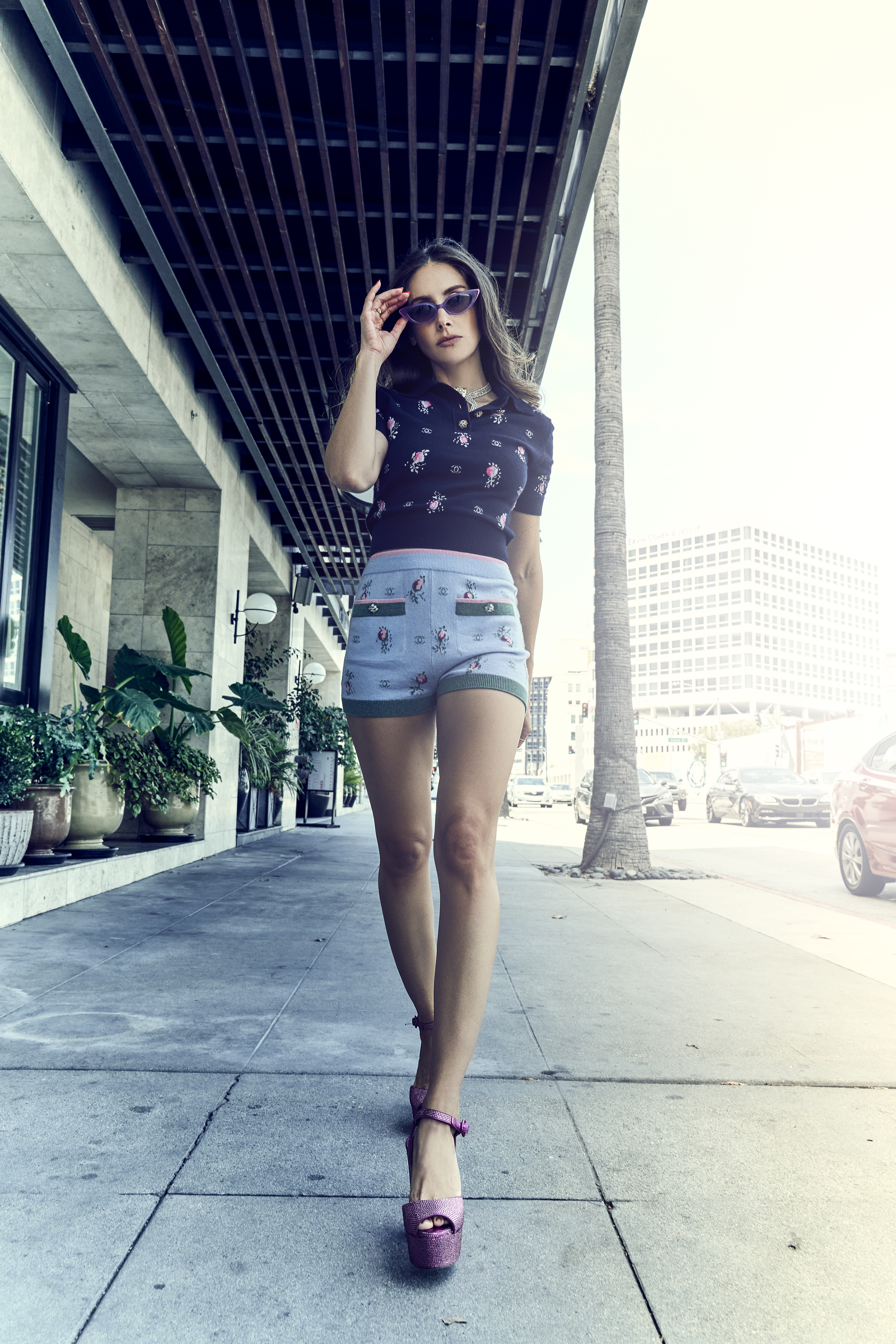
Chanel Top, Shorts, Choker, and Rings; Le Silla Shoes; Etnia Barcelona Sunglasses; David Yurman Rings.
TR: Share what has got to be the great story behind how Spin Me Round came together. Your character, Amber, is a manager at an Italian restaurant chain who wins a company trip to Italy, and then some, let's just leave it at that. All the things ensue. You wrote, produced, and star in it. What an incredible ensemble of talent. Jeff Baena, the Duplass Brothers, the cast. Wow.
"With every character that I play, I have to find the human parts."
AB: Jeff and I have collaborated four times now. I've been in two of his films, this is the second film that we've co-written and co-produced together. He brought the idea to me. We had a great time making Horse Girl together, and he had been kicking this idea around for a while. It's based on an article that he read, about a real program. The true parts are a small portion of our film, but there is a real program that a certain Italian restaurant chain has in the States, their exemplary managers program, in which they send a select few managers to Italy for an all-expenses paid trip, to be immersed in the food and culture. What the article ends up outlining, is how lackluster the trip ends up being, that they're actually staying in these dormitory-style buildings that feel like Burbank. Not to neg on Burbank, I love Burbank. But it's not Italy. The highlight of the trip was them learning to make a Bolognese sauce, and taking photos with the owner. Jeff read that article and saw the potential for a lot of comedy in it, and also the potential to bring a great ensemble together, and create a bunch of different characters to exist together in that world. From there, he brought it to me after he'd beaten out a ten page outline with the broad strokes of the film. What I really was excited to dig into, were the tonal shifts of the movie, and the way in which the characters---while the trip is not going the way that they expected it to---try to take things into their own hands because they're so determined to have an extraordinary time. That also derails things, because of their mishandling and misinterpreting of certain situations. We both really like this idea of expectation, the expectation behind a once-in-a-lifetime trip, a once-in-a-lifetime opportunity---and then it all really falling flat.
TR: It's very universal idea and circumstance. And it makes me think of that cliche comment, one I've made myself, 10,000 times, 'Any trip to Italy is a great trip to Italy, any meal in Italy is a great meal. You can't have a bad vacation in Italy, you can't have a bad meal in Italy'. Well, you actually can.
AB: It's possible. We put expectations on our experiences, and other people can put expectations on us. My character has everyone telling her she's going to fall in love. You're going to Italy, you're going fall in love. And that has her a little out of whack. As things happen, she's in this weird state of going with the flow. I guess I'm going fall in love; I guess that's what I should want and what I should be embracing. For that reason, it takes her a little longer to catch up to some of the things that are making her uncomfortable.
TR: As a writer, what key elements of language and theme and detail were you intent on contributing? What was important to you?
AB: I always like to bring a lot of personal experience to my writing, sometimes on a micro level, and sometimes, verbatim. I tell a very lame story in the movie about smoking clove cigarettes as a teenager, which is a true story from my life. That kind of thing will come from a moment when Jeff will be like, 'I feel like you should talk about something else here.' And I'll tell him, 'Well, you know, in high school I smoked cloves and bla bla bla,'. I tell a mundane story, and he goes, 'That's perfect.' There are aspects of my reality too, in Amber's relationship with Alessandro Nivola's character, Nick. I'm pulling from the experiences I've had in my life. When I was in my 20s, there were certain experiences I had with men in which I was made to feel uncomfortable, or didn't feel so uncomfortable at first, but then realized certain things later.
TR: I think a lot of us have discoveries like that, upon later reflection. 'Oh, those were really creepy conversations'. What was I willing to sit through?
"The rom-com of the '90s was that movie that encapsulated it all. It was not flighty. It was not nothing. It wasn't like empty carbs. These are all things that Dave and I were thinking about, as we were writing Somebody I Used to Know."
AB: Yeah, absolutely, 'What was I willing to sit through?' And also, why did this person need to manipulate me when I was already open? Things that make you think, that behavior I thought was kind of funny in the moment, actually feels a little sinister the more I understand myself. Inherent in the work Jeff and I do together, is that we're both excited by the awkwardness of the human experience. That is a big part of the language and the beat of this movie. We let some scenes really sit. We let the audience really sit in awkwardness between the characters. I think that kind of stuff is funny.
TR: The characters are so brilliant, and the casting of the characters is so brilliant. The variety in characters in Spin Me Round is so fun.
AB: Thank you. We got so lucky with a really great cast, all these people that were so willing to go on this ride with us. They all bring something really unique. All of the actors in this movie are so unique in the type of work that they do. They all bring very individual energy to the table. Once we cast the movie, there were certain people in the film we wrote the roles specifically for. For the majority of the cast, it was more like once we cast the roles, we went back into the script and tailored each role a little bit more to them. Then came the stage of being on set, in the moment, and letting the actors riff a little bit, putting things in their own words, really make the characters their own. It was another an embarrassment of riches! Everyone is just so talented. It was a lot of fun. There was no moment when we felt we had to identify the tone. Everyone was so tuned in to what we were making.
"It was really fun to be back on set with Danny Pudi, because we haven't worked together since Community. I think the Community fans will enjoy seeing us together. There's a vibe."
TR: What about the details in the sets and costumes, the pop culture references, the whole concept of Tuscan Grove restaurants, in Spin Me Round, did you love most?
AB: ...I love the Tuscan Grove chef's outfits!
TR: ...And Molly [Shannon's] character is in Italy, so she's buying herself a wardrobe of dramatic hats, brooches, and clothes, it's just so funny. There are so many moments like that; the big Italian party with everyone in their skintight Italian mini dresses...
AB: You hit the nail on the head. I think those are the best parts [laughs]. Our costume designer on this is Beth Morgan, who did the costumes for GLOW, we pretty much roped her into doing Horse Girl with us, and then were like, 'You've got to do one more, Beth!'. Beth is so good at what she does, so thoughtful in the way she works, the way she makes everything so character-driven and so much about the story and the arcs of the characters. She got to have the most fun with Molly's wardrobe. And some of those pieces, at least a couple of them, I think, are from Molly's closet!
TR: What's the story behind the title for the film?
"What I really was excited to dig into, were the tonal shifts of the movie, and the way in which the characters---while the trip is not going the way that they expected it to---try to take things into their own hands because they're so determined to have an extraordinary time."
AB: The title was Jeff's idea. It comes from the Roxy Music song of the same name. It encapsulates the essence of the movie. It points to the question, what are you left with, when you are taken on a ride? What's left in the aftermath? What are you feeling? Did you learn anything? Was there substance or meaning to it all? Jeff likes to say that it's like movie making, when when you're done, and it's like the circus has left town. This extraordinary thing happened, everything popped up, then it's over and done. You're watching my character analyze everything. Did it mean anything to her? Ultimately, it did. She is changed by the trip. Her job hasn't changed yet; going on this trip isn't going to erase her debt. Yet, as a person, she comes out of it ever so slightly more assertive. Ultimately, it's hopeful.
TR: The film is so funny in a lot of layered ways. What do you think is the social commentary underneath it all? What's the film saying about current culture?
"We put expectations on our experiences, and other people can put expectations on us. My character has everyone telling her she's going to fall in love. You're going to Italy, you're going fall in love. And that has her a little out of whack."
AB: We didn't write it with an agenda. So much of the creative process, for me, is a bit unconscious. Something like that will probably be revealed once people start seeing the movie. It's always fascinating to me, the journey that a movie takes, especially now, as I've been creating stuff. Like working on Horse Girl from start to finish, knowing what our intention was with the movie, then seeing the reaction to it, the way that it touches people, the way that people are affected by it in ways that I didn't expect, and how powerful that is. Learning that, truly, once you put a movie out, it doesn't belong to you anymore. Now it kind of belongs to everybody.
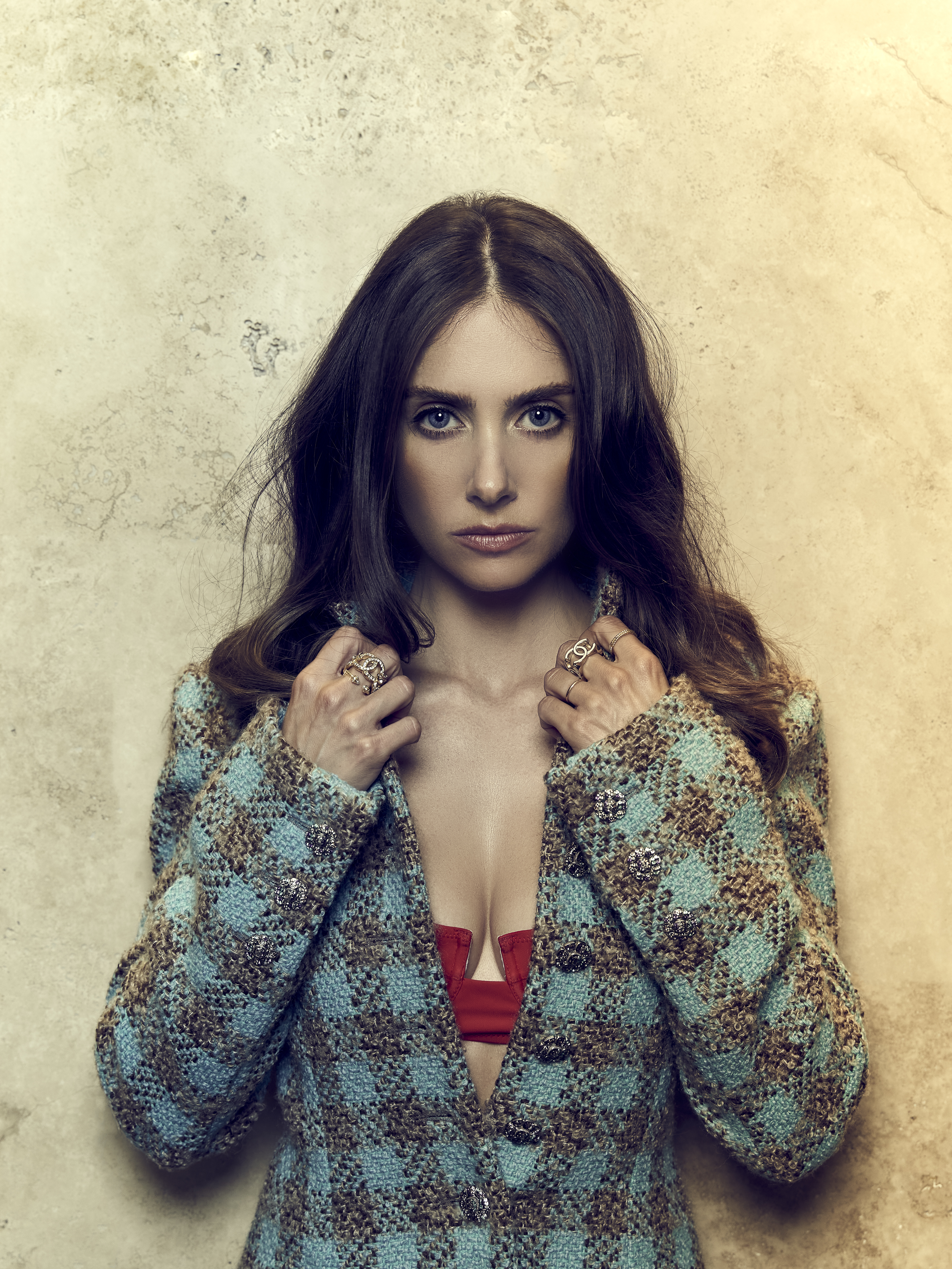
"For this shoot, I wanted Alison to have a 60’s inspired blowout. Alison has the most perfect hair for this look. I sprayed her damp hair with Unite Hair Boosta Spray for hold control and volume. I added a nickel size of Bumble and Bumble Styling Creme at the root, I dried the product into the hair, then used a T3micro 1.25-inch barrel curling iron and set the hair in pin curls. I added Kevin Murphy Bedroom Hair Texturizing Hairspray when I took the curls down, and a little of Kevin Murphy’s Powder Puff Volumizing Powder at the crown for extra volume." - Hairstylist Clariss Rubenstein
"I love Dior Backstage Glow Face Palette 001 for use all around the face, I work with the blush, the bronze, and highlight, all together. I love the superfine high shine it gives. It's lovely on the eyes as well.” - Makeup Artist Molly Greenwald
#BTS
AUGUST 2022 COVER
ALISON BRIE
LOCATION 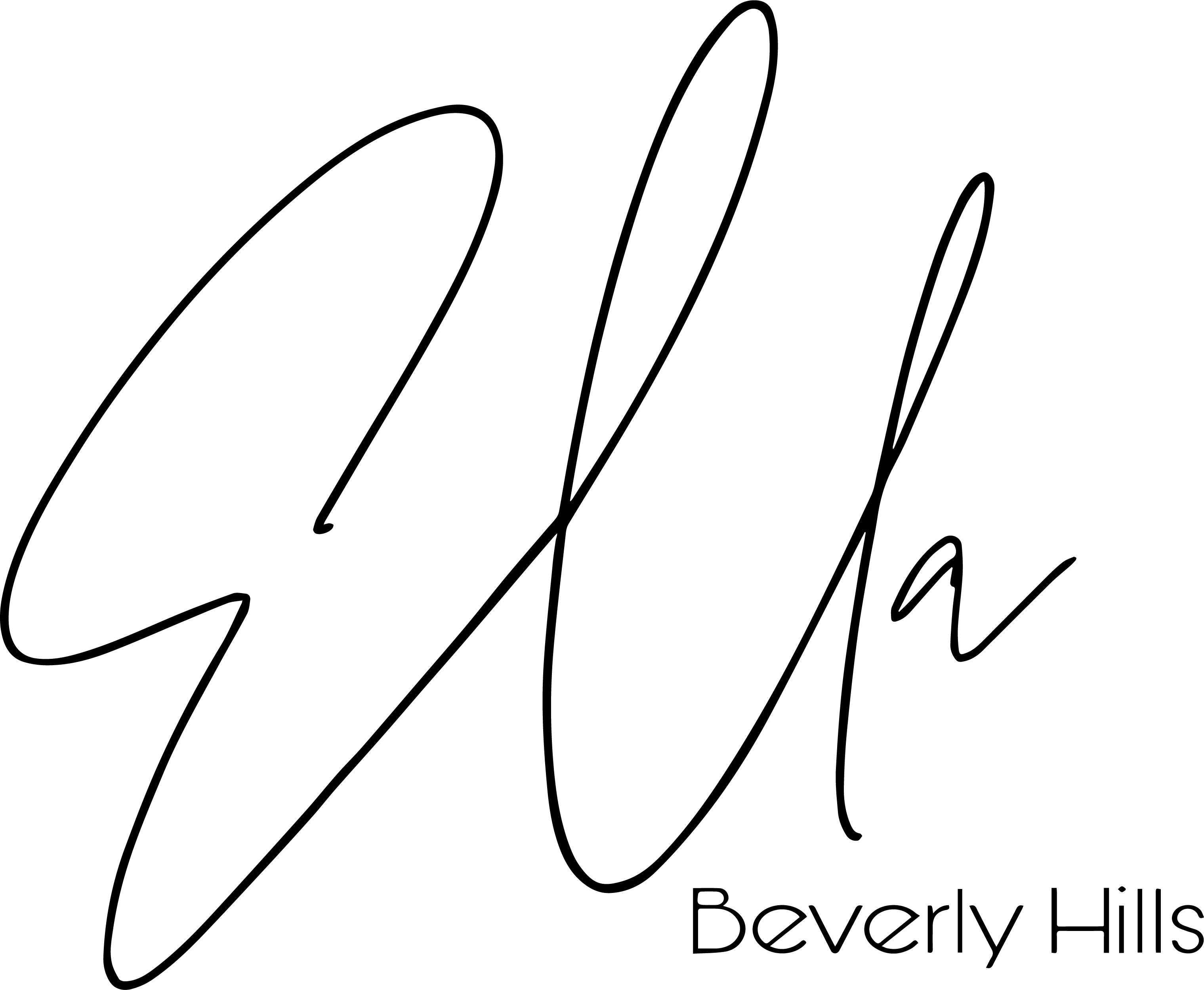
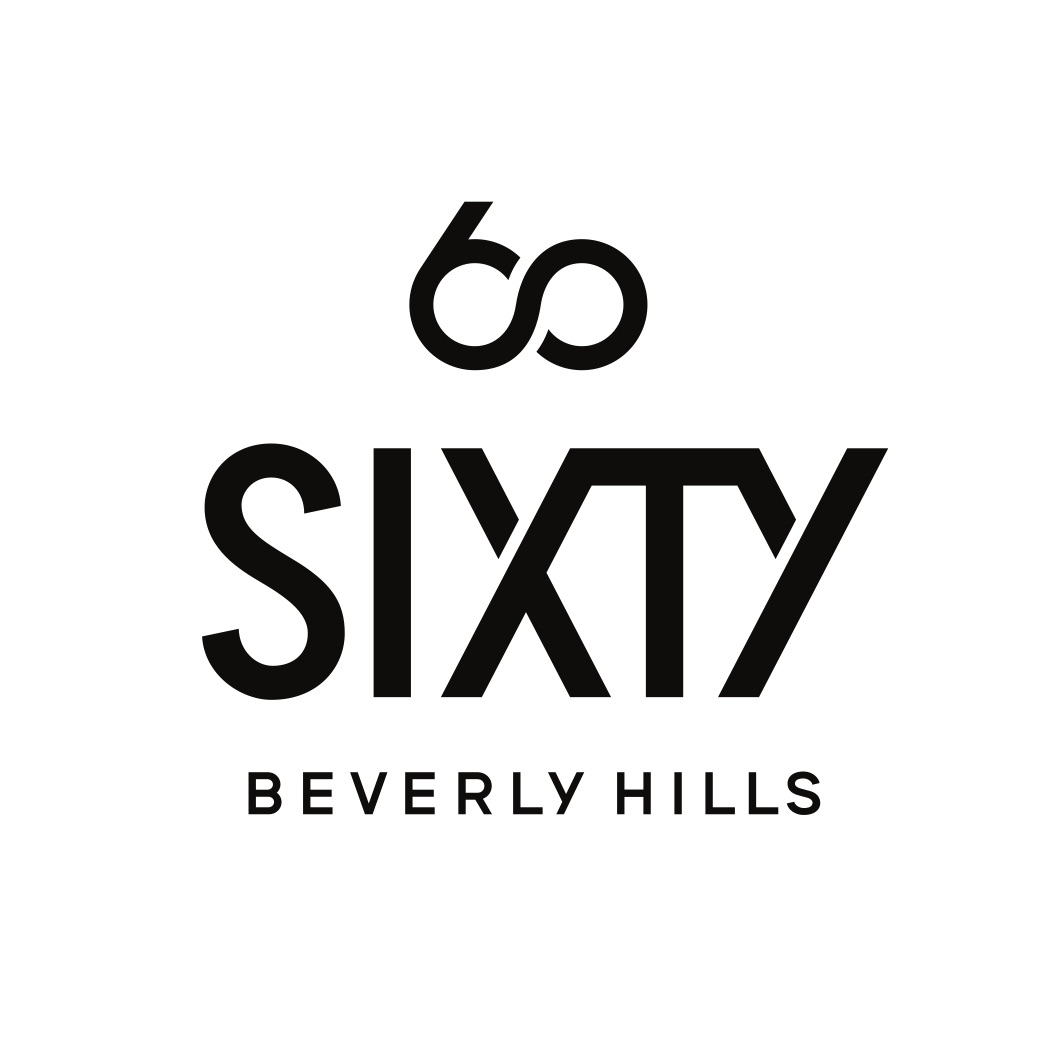
PHOTOGRAPHER
RANDALL SLAVIN
STYLIST
ERIN WALSH
A-FRAME AGENCY
HAIR
CLARISS RUBENSTEIN
A-FRAME AGENCY
MAKEUP
MOLLY GREENWALD
A-FRAME AGENCY
MANICURIST
CHI PHAN
CLOUTIER REMIX
PRODUCTION
FERALCAT PRODUCTIONS
ASSISTANT: PHOTO: CHRIS BALDWIN, FASHION: ANNIE EASTON
"I'm obsessed with my ZIIP GX facial device. It stimulates collagen, and it's really indulgent, yummy me-time. I made everyone on the set of Happiest Season obsessed with it."
"Another obsession of mine is the HigherDose Infrared Sauna Blanket. I've been using it once a week, I do anywhere from thirty-five to forty minutes, then I immediately get in a cold shower for at least two minutes. It's a shock to the system, and my skin feels great afterwards."
"The movie Fire Island is fantastic. It stars Bowen Yang, Joel Kim Booster, and Matt Rogers---it's a great ensemble. The weekend it came out, I watched it three times. It's just delightful."
"I love the show I Love That For You, which stars some of our Spin Me Round ensemble, like Molly Shannon and Ayden Mayeri. Vanessa Bayer is so funny, and I laugh out loud during every episode."
"I read Lisa Taddeo's book Three Women when it came out. I was so obsessed with it, and now they've made it into a series. Her writing is very dark but it holds a lot of truth about the female experience, and that really resonates with me."
"I love the NYT cooking app. The recipes are great."
